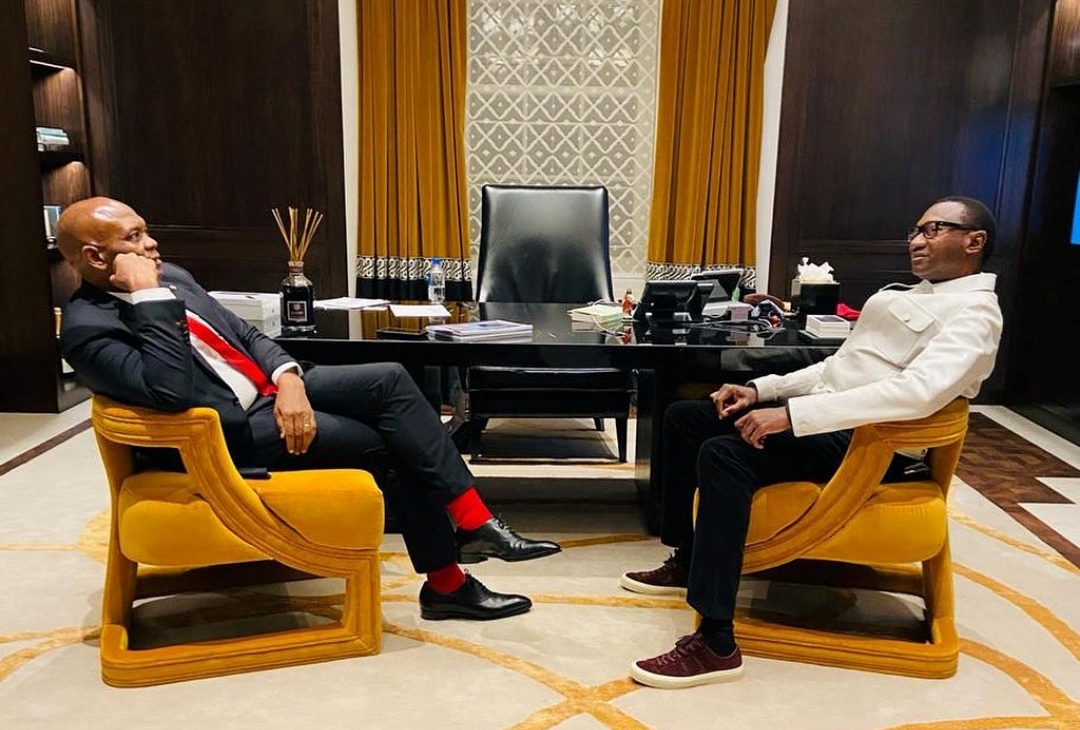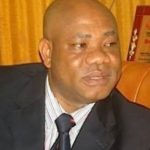...To get all news updates, Join our WhatsApp Group (Click Here)
Also Join our WhatsApp Channel (Click Here)
Energy tycoon and investor Femi Otedola has stated that his decision to acquire shares of Transnational Corporation of Nigeria (Transcorp) was purely driven by his desire to unlock the actual value of a company severely undervalued by the Nigerian investing public and the company’s leading shareholders.
Otedola, 60, announced in a written statement he issued to select media outlets.
It is his first commentary on the saga that shook the Nigerian stock market to its foundations weeks ago.
In his statement, Otedola explained that he offered to acquire Transcorp Plc for N250 billion ($543 million), but Tony Elumelu, fellow billionaire and the company’s chairman rejected his offer.
Otedola recently sold off his entire shares in Transcorp Plc to Elumelu, the company’s chairman and largest shareholder, two weeks after he had amassed up to a 6.3% stake in the company, thereby ending the race for the group’s top ownership.
Elumelu had previously increased his stake from 2.07 to 25.9 percent within days of acquiring a significant position.
According to sources familiar with the situation, Otedola’s move to take the top seat in the conglomerate’s ownership allegedly upset Elumelu, the Transcorp chairman, causing him to initiate negotiations.
According to reports, the Heirs Holdings Chairman eventually agreed to compensate Otedola with millions of dollars and pay him off for the value of his shares.
But in a recent statement, Otedola, Chairman of Geregu Power Plc, revealed for the first time how in 2005 he had backed Elumelu’s acquisition of a controlling stake in the United Bank for Africa from Nigerian businessman Hakeem Belo-Osagie.
While Elumelu struggled to raise the $100 million he needed for the UBA deal, Otedola said he provided Elumelu with $20 million (N2 billion then) which form part of the funds (alongside other wealthy Nigerians who rallied around and supported Elumelu) and Belo-Osagie later sold his controlling stake to Elumelu.
Despite this generous act of friendship, Otedola claimed Elumelu would go on to stab him in the back.
According to Otedola, when he informed Elumelu of his interest in acquiring the Ughelli Power Plant in 2012, the Transcorp chairman “quietly went ahead” to outbid him.
Otedola further claimed that Elumelu had previously taken advantage of his (Otedola’s) business difficulties and eventual bankruptcy to purchase interests in several firms, including Transcorp Hotel.
Full Statement by Femi Otedola
In 2005, while Tony was the Managing Director of Standard Trust Bank he approached me to get funds to acquire UBA. I enthusiastically gave him $20 million, which was N2 billion at that time to buy the necessary shares in UBA for the acquisition.
After a short period of time the share price moved up and I decided it is was a good moment to sell and get out of the bank.
However, Tony appealed to me to hold on to the shares as he was convinced that there were future prospects – so I kept the shares.
I became Chairman of Transcorp Hotel in 2007 with a shareholding of 5% and unknowingly Tony gradually started buying shares quietly.
By the following year in 2008 I went bankrupt in Nigeria. Tony proceeded to take my shares in UBA to service the interest on my loans and he also took over my shares in Africa Finance Corporation, where I was the largest shareholder.
Shortly after, Albert Okumagba informed me that an American firm wanted to acquire my shares in Transcorp, which I then agreed to sell. However, this supposed American firm turned out to be Tony Elumelu. The revelation of this prompted me to resign as Chairman of the hotel.
Years later in 2012 Tony said he wanted to see me so we met in my office where I had previously had a meeting with foreign investors who had not yet departed the premises. Curious to know, he asked what sort of meeting I had had and I disclosed that I wanted to go into the power business, specifically Ughelli Power Plant. Tony quietly went ahead to bid for Ughelli and he outbidded me by offering to buy the plant for $300 million.
And as a some would say: the rest is history.
Fast forward to the present…
I offered to buy Transcorp Plc for N250 billion, but unfortunately, my offer was rejected. My goal was to maximize the company’s potential as a Nigerian conglomerate with a market cap of at least N2 trillion instead of the current N40 billion, but it seems some shareholders have a different vision.
As a businessman, I believe in healthy competition and market dynamics. Two captains cannot man a ship, and I respect the majority shareholder’s decision to buy me out. This is the nature of the game.
But let me be clear: my offer was made with the best intentions for Transcorp Plc and its shareholders. I saw an opportunity to unlock the company’s full potential and create value for everyone involved.
It’s important for investors to understand that free entry and free exit are crucial to healthy markets. The scramble for shares after my acquisition is a testament to the value that Transcorp Plc can offer, and I hope the company continues to thrive under new leadership.
My message to Transcorp Plc and its shareholders is this: I remain committed to the growth and success of Nigerian businesses, and I will always be looking for ways to create value for all stakeholders.
Stakeholders are unfortunately always shortchanged by getting stipends while the owners and managers of the business live a jet set lifestyle, which is detrimental to the stakeholders. Thank you for the opportunity to engage in this exciting chapter of Transcorp’s history.
You can get every of our news as soon as they drop on WhatsApp ...To get all news updates, Join our WhatsApp Group (Click Here)
Also Join our WhatsApp Channel (Click Here)

















